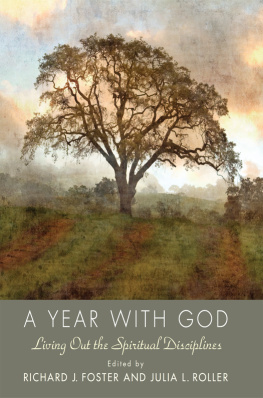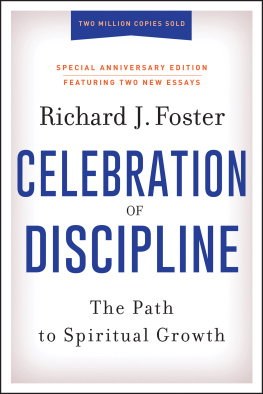Epigraph

You shall love your neighbor as yourself.
Jesus of Nazareth (Mark 12:31)
Come, let us go up to the mountain of the L O R D ,
to the house of the God of Jacob;
that he may teach us his ways
and that we may walk in his paths.
Isaiah the prophet (Isa. 2:3)
The chief thing is to love others like yourself, thats the chief thing, and thats everything; nothing else is wantedyou will find out at once how to arrange it all. And yet its an old truth which has been told and retold a billion timesbut it has not formed part of our lives!
Fyodor Dostoevsky, The Dream of a Ridiculous Man
Love seeketh not Itself to please,
Nor for itself hath any care;
But for another gives its ease,
And builds a Heaven in Hells despair.
So sung a little Clod of Clay,
Trodden with the cattles feet;
But a Pebble of the brook,
Warbled out these metres meet
Love seeketh only self to please,
To bind another to Its delight,
Joys in anothers loss of ease,
And builds a Hell in Heavens despite.
William Blake, The Clod and the Pebble
When one has once fully entered the realm of Love, the worldno matter how imperfectbecomes rich and beautiful, it consists solely of opportunities for Love.
Sren Kierkegaard

Contents
Cover
Title Page
Copyright Page
Endorsements
Dedication
Epigraph
Foreword by James K. A. Smith
Preface
Introduction: Spiritual HeroinHow Not to Get Fixed
1. Spiritual Disciplines and the Way of Love
2. What Do You Have That You Did Not Receive?
Simplicity and Renewed Owning
3. Directions for Ruling the Mind
Meditation and Renewed Thinking
4. This Is My Tummy, Which I Will Curb for You
Fasting and Feasting and Renewed Eating
5. Time-Out for Adults
Solitude and Renewed Socializing
6. Controlling the Chatterbox
Silence and Renewed Talking
Service and Renewed Working
8. Work Hard, Consecrate Hard
Sabbath Keeping and Renewed Resting
9. Whos Afraid of Love?
Everyday Discipline for the Life of the World
Acknowledgments
Notes
Further Reading
Index
Back Cover
Foreword
Imagine a unique treeone that grows in the soil of church fathers such as John Cassian and Gregory the Great, with roots that trace back to old vines in Abraham Kuyper and Sren Kierkegaard, and branches grafted from Dallas Willard and Richard Mouw. The fruit of such a tree is this book: a vision for how to do life in the Spirit.
If I could, Id insert Practices of Love as volume 1.5 in my Cultural Liturgies trilogy. Giants such as Dallas Willard and Richard Foster showed us the significance of the spiritual disciplines for sanctification: Jesus invites us to follow him by doing what he does , not just thinking Gods thoughts after him. In Desiring the Kingdom (and You Are What You Love ), I tried to provide an ecclesiological assist to their spiritual disciplines project, arguing for the communal, gathered practices of worship as the hub for those other spiritual disciplinesthat sacramental worship is the heart of discipleship. But in Practices of Love , Kyle Bennett expands the frame and shows us another part of the picture: all these disciplines are undertaken not just for our own relationship to God but also as a way to love our neighbor.
In other words, the spiritual disciplines are how we learn to obey the greatest commandments (Matt. 22:3640): this is both how you learn to love God with all your heart, soul, and mind and how you learn to love your neighbor as yourself. Bennett calls this flipping the spiritual disciplines on their sideapproaching them not merely as vertical channels for cultivating our relationship with God but as horizontal conduits that direct us into loving what God loves, including our neighbors and Gods creation. Through the disciplines the Spirit invites us to unlearn the habits that lead us to ignore, dismiss, or just plain walk all over our neighbors in their need and vulnerability. The spiritual disciplines are a workshop for crooked, broken culture makers.
Every facet of our Monday to Saturday lives comes into view here. This book is invasive: its going to push its way into your eating and your spending. Its going to take hold of your smartphone and your calendar. It will insert its argument into your family and your friendships. But thats because all of them matter to God. The spiritual disciplinesthe practices of loveare how we learn to live out the Kuyperian conviction that there is not a single square inch of creation that isnt claimed by Jesus. But Bennett reminds us that the creation-claiming Jesus also gives us the gift of these practices to occupy creation in ways that are faithful, life giving, and attentive to our neighbors. This is why Bennett rightly describes his project as a Christian philosophy of public affairs. But dont let that scare you off: Bennetts lively prose and passionate verve will make you forget every caricature of the tweedy, elbow-patched philosopher. This is feisty Christian thinking with wit and wisdom and both eyes fixed squarely on the nitty-gritty realities of the proverbial real world. Above all, this book is a thoughtful invitation to life like the new creatures that we are.









